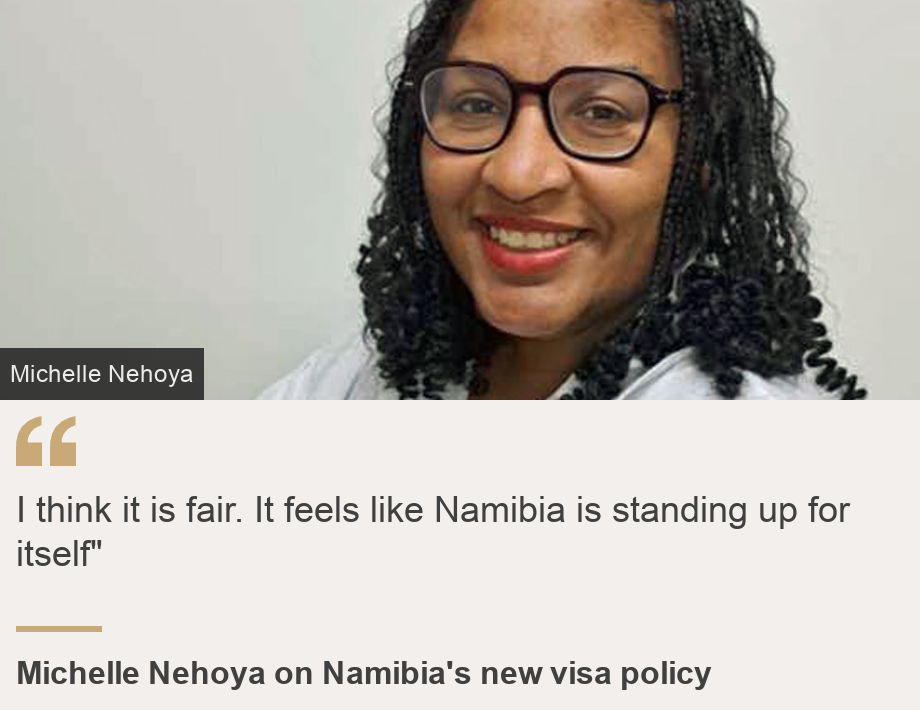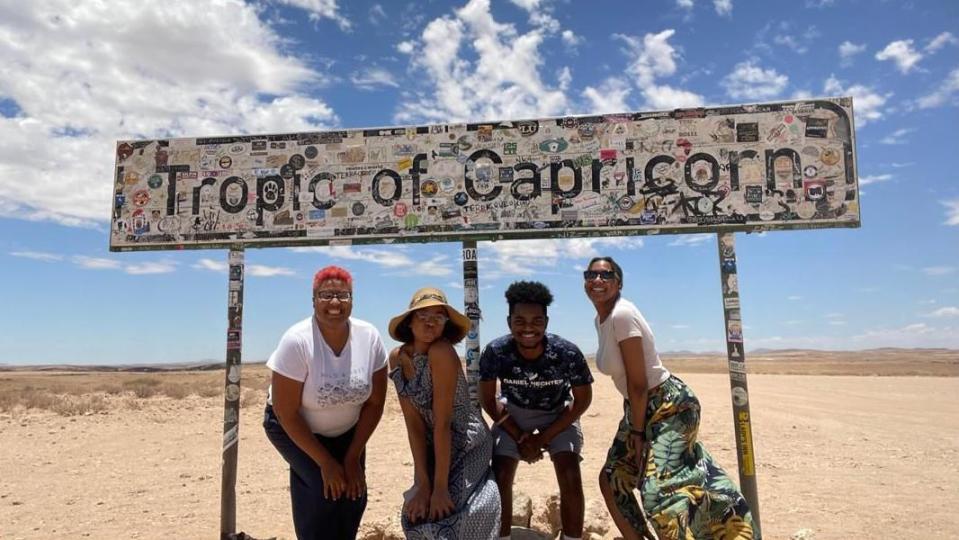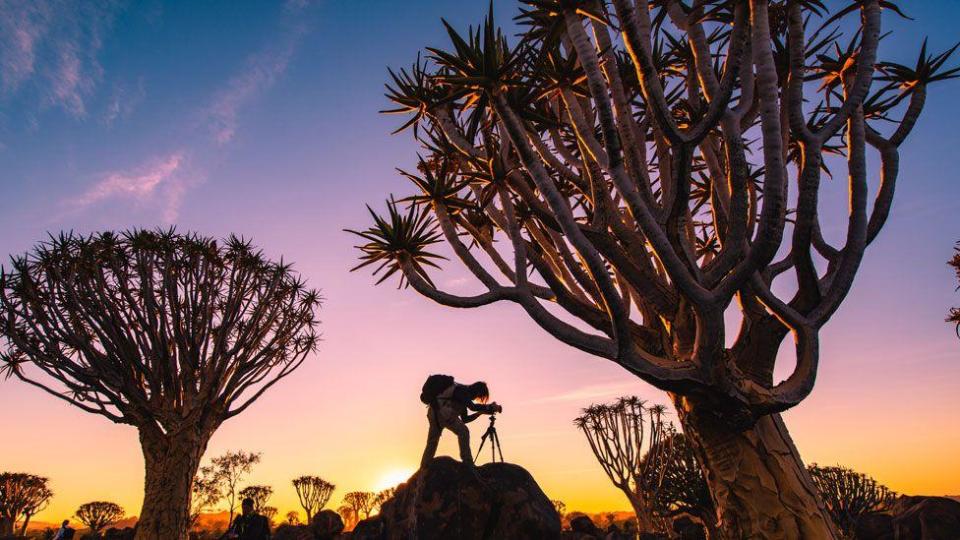Namibian Michelle Nehoya spent almost $500 (£390) on a visa application to visit Canada – but almost two years later it still hasn’t come to fruition.
The 38-year-old, who lives in Namibia’s capital, Windhoek, is desperate to get to Quebec to see her aunt and cousins who she hasn’t seen in almost a decade.
The visa application involved filling out several forms – and among other requirements, she also had to provide six months’ worth of bank statements, a letter of invitation and a detailed travel history.
It is not possible to apply in Namibia, so this also meant traveling to South Africa to present your biometric details, which involves giving you fingerprints and taking a photo.
His experience is not uncommon for Africans traveling to Western countries.
In 2022, seven of the top 10 countries with the highest visa rejection rates in the bloc of European countries known as the Schengen area were African, according to consulting firm Henley and Partners.
“It was time-consuming and frustrating. They didn’t give me any reason why it took so long,” Nehoya told the BBC.
However, if your family in Quebec decides to travel to Namibia on Canadian passports, you will not face anything like the challenges and costs that she did. Currently, Canadian citizens can enter Namibia without a visa.
But that will change within eight months.

Starting next April, Canadian citizens, along with those from Germany, the US, the UK and 29 other countries, will need a visa for entry.
These include all “non-reciprocal countries” – meaning the new visa rules will affect citizens of all countries that require Namibian passport holders to have visas.
“Namibia extended gestures of goodwill and favorable treatment to nationals of various countries. However, despite these efforts, certain nations have not reciprocated,” the Namibian Ministry of Immigration said in May.
“In light of this disparity, the government found it necessary to implement a visa requirement to ensure parity and fairness in diplomatic interactions.”
But these visitors will be able to purchase their 90-day visa, costing $90, upon arrival in Namibia – unlike the onerous requirements imposed on African passport holders who need to obtain their visas in advance.
The British High Commissioner to Namibia, Charles Moore, said he respected Namibia’s right to impose new regulations.
“[The UK] unfortunately, we imposed a visa regime on Namibia last year due to the number of asylum seekers we were receiving. This had an impact on our relationship with Namibia,” he said.
A UK government statement further explained that there has been a sustained and significant increase in the number of asylum applications from Namibians at the UK border since 2016.
“This constitutes an abuse of the provision to visit the UK for a limited period as visa-free citizens,” he said.


For Ms. Nehoya, the announcement of the visa for Namibia should have been made a long time ago: “I think it’s fair. It looks like Namibia is defending itself.”
Social media reactions to the news echo their sentiments.
“Finally. I hope they also require them to present a bible of documents, undergo medical examinations, [and] Namibian language tests,” wrote one commenter.
Another said: “If I need to bring bank statements… and all kinds of documents and still buy a visa just to enter a country, that country must also do the same to be able to enter my country.”
And visas to the Schengen area, the US and Canada are not cheap for African passport holders.
The European Union made more than €53 million ($58 million; £45 million) from rejected visa applications from African countries in 2023, according to a recent report by Lago Collective, a think tank that focuses on migration.
Visas can be rejected for a variety of reasons. The report says most rejections are based on “reasonable doubts about the visa applicant’s intention to return home”.
In June 2024, the price of short-stay Schengen visas rose from €80 to €90 for adults, and in October 2023, the UK visa fee increased from £100 to £115.
The report also showed that almost a third of Africans who applied for a Schengen visa were rejected, a figure higher than the global average.
Even when visas are approved, African travelers say their experiences at border security leave them feeling uncomfortable and unwelcome.
Winnie Byanyima, head of UNAIDS and herself Ugandan, drew attention to this when she tweeted in 2022: “I’m at Geneva airport, almost refused to board, all documents examined repeatedly, calls made… Boarding last.


Although Namibia’s visa initiative has received praise on social media, the tourism industry is less enthusiastic.
The Namibian Hospitality Association said it was “very concerned” about the message it “sends to the global travel trade”.
In 2022, the tourism sector represented 7% of GDP, making it the third largest contributor to the economy – with the majority of tourists coming from countries such as Germany and the USA.
While Windhoek-based tourism expert Soni Nrupesh believes the visa change will not deter visitors: “It won’t change much; you can still board a plane without a visa.
“It’s only when you arrive at the airport that you will fill out a form, pay the fees and enter.”
Potential travelers like Nehoya hope this kind of reciprocity is the future for everyone.
“People come to Namibia and they love it. But we also want to see what’s happening on the other side,” she says.
“It would be nice to go to Canada, the US or the UK and get a visa on arrival. But now, we must plan everything well in advance.”
You might also be interested in:


Go to BBCAfrica.com for more news from the African continent.
Follow us on Twitter @BBCAfricaon Facebook at BBC Africa or on Instagram at bbcafrica






























